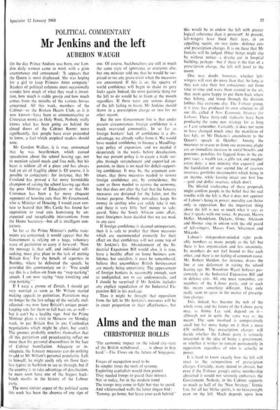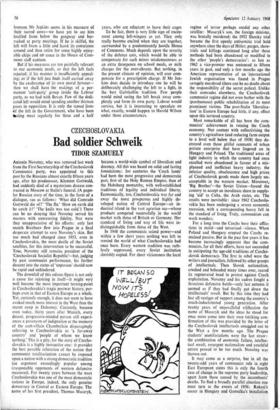Mr Jenkins and the left
POLITICAL COMMENTARY AUBERON WAUGH
On the day Prince Andrew was born. our Lon- don daily woman came to work with a grim countenance and announced: `It appears that the Queen is most displeased. She was hoping for a girl to keep Princess Anne company.' Readers of political columns must occasionally wonder how much of what they read is inven- tion, how much is stable gossip and how much comes from the mouths of the various horses concerned. All this week, members of the Cabinet—or the Broken Hearts Club, as it is now known—have been as communicative as Cistercian monks in Holy Week. Nobody really knows what has been going on behind the closed doors of the Cabinet Room; more significantly, few people have even pretended to know, a fact which sceptical readers should note.
Mr Gordon Walker, it is true, announced that he was heartbroken, which• caused speculation about the school leaving age, not to mention school meals and free milk, but his heart is seldom all of a piece and has always had an air of fragility about it. Of course, it is possible to conjecture: for instance, that Mr Crosland has proved a far more formidable champion of raising the school leaving age than the poor Minister of Education: or that Mr Crossman has been a far more eloquent opponent of housing cuts than Mr Greenwood, who is Minister of Housing. I would even ven- ture to hazard that Mrs Castle has found her opposition to road cuts hamstrung by un- expected and inexplicable interventions from the Home Secretary—but all is intelligent con- jecture.
So far as the Prime Minister's public state- ments are concerned, it would appear that the Government is relying on a huge, voluntary wave of patriotism to carry it forward: 'Now the message is that self, and individual self- seeking, must give place to the task of putting Britain first.' For the benefit of reporters in Burnley, where he delivered the speech, he. provided this commentary on it: `You could say this is a follow-on from my "stop narking" speech. I am now saying "stop knocking and stop narking."' If I were a gnome of airich. I should get very worried as soon as Mr Wilson started making appeals to patriotism. Patriotism may no longer be the last refuge of the socially mal- adjusted—we now have Britain's unique peace- keeping role for them to fall back on, as well— but it can't be a healthy sign. And the Prime Minister plans a visit to Moscow on Monday week, to put Britain first in any Cambodian negotiations which might be afoot, but aren't. The gnomes probably comfort themselves that all this patriotism and peacekeeping reflect no more than his personal discomfiture in the face of Cabinet humiliation. Adequate or in- adequate, the January measures can do nothing to add to Mr Wilson's personal popularity. Left to himself, he might easily rely on those fear- less typists in Surbiton to see us through, but if the country is to take advantage of devaluation, he must soon have one of the biggest back- bench revolts in the history of the Labour party.
The most sinister aspect of the political scene this. week has been the absence of .any sign of one. Of course, backbenchers are still in much the same state of ignorance as everyone else, but one minister told me that he would be sur- prised to see any grave crisis when the measures are announced. If this is so, the spectre of world confidence will begin to shake its gory locks again. Indeed, the most patriotic thing for the left to do would be to foam at the mouth regardless. If there were any serious danger of the left failing to foam. Mr Jenkins should throw in a prescription charge or two for no other reason.
But the new Government line is that under present circumstances foreign confidence is a much overrated commodity. In so far as foreign bankers' lack of confidence is a dis- advantage, we already suffer from it. We would have needed confidence to finance a Maudling- type policy of expansion, and we needed it desperately in the weeks before devaluation, but our present policy is to create a trade sur- plus through retrenchment and export-lcd ex- pansion, so there is no need for deficit-support- ing confidence. It may be, the argument con- tinues, that those measures needed to restore foreign Confidence are, by coincidence, the same as those needed to restore the economy. but that does not alter the fact that the January measures are designed for the latter, not the former purpose. Nobody nowadays keeps his money in sterling who can safely take it out. and there is very little 'hot' money to safe- guard. Since the South African arms affair, most foreigners have decided that we are mad, in any case.
If foreign confidence is deemed unimportant, then it is safe to predict that those measures which are recommended primarily for their effect on that confidence will not come top of Mr Jenkins's list. Abandonment of the In- dustrial Expansion Bill would also, it is true, have a healthy effect on home business con- fidence, but socialists, it must be remembered, believe that unconfident British businessmen are merely being unpatriotic. The appeasement of foreign bankers is. reasonably enough. seen as undignified, not to say undemocratic, and I should be surprised if Mr Jenkins includes any explicit repudiation of the Industrial Ex- pansion Bill in his package.
Thus it might be thought that opposition from the left to Mr Jenkins's measures will be in exact proportion to their effectiveness. but
this would be to endow the left with greater logical coherence than it possesses': At present, left-wingers have fixed their eyes, in an appalling squint, on two items—defence cuts and prescription charges. It is on these that Mr Jenkins will be judged. Other things might slip by without notice—a drastic cut in hospital building, perhaps—but if there is the hint of a prescription charge, the left will howl to the moon.
One may doubt, however, whether left- wingers will ever do more than that. So long as they can take their hot consciences out from time to time and wave them around in the air, they seem quite happy to put them back where they belong, and troop through the division lobbies like everyone else. The Tribune group. • it is true. has produced its own solution to all our ills, called A Neir Economic Strategy for Labour. These forty-odd stalwarts have been producing the same new strategy for as long as I can remember. Certainly, it does not seem to have changed much since the manifesto of last July, or Mr Dickens's amendment to the Queen's speech in October. Among the measures to rescue us from our economic, plight are an immediate increase in social benefits and pensions; penalties for laggard firms in the ex- port race; a wealth tax, a gifts tax and tougher estate duty: a new ministry (for exports); and the liquidation of our- second line of reserves (overseas portfolio investments) which bring in an income, while leaving intact our first line —gold and dollar reserves, which don't.
The blissful irrelevance of these proposals might confirm people in the belief that the real trouble with the left is that it does not approve of Labour's being in power: morality can thrive only in opposition. But the important thing about the left is not so much what it says as that it speaks with one voice. At present. Messrs Heifer, Mendelson. Dickens, Orme. Atkinson and Horner sing in unison with the old guard of left-wingers, Messrs Foot, Silverman and Mikardo.
Labour's independent-minded right prob- ably numbers as many people as the left but there is less organisation and less unanimity. Its members do not feel bound to like each other, and there is no feeling of common cause. Mr. Robert Sheldon. for instance, draws the line at any deferment in raising the school leaving age. Mr Woodrow Wyatt believes pas- sionately in the Industrial Expansion Bill and in defence cuts. All, one must remember, are members of the Labour party, and to each this means something different. They only really seem to agree in the matter of prescrip- tion charges.
This, indeed, has become the nub of the whole issue, and the future of the Labour party may, as Jennie Lee said, depend on it— although not in quite the same way as she meant. The sum involved is comparatively small but far more hangs on it than a mere £50 million. The prescription charges will decide whether the Labour party is seriously interested in the idea of being a government, or whether it wishes to remain permanently in opposition, regardless of who is actually in power.
It is hard to know exactly how the left will react to the reimposition of prescription charges. Certainly, many intend to abstain, but even if the Tribune group's entire membership abstained it would not seriously embarrass the Government. Nobody in the Cabinet supports so much as half of the 'New Strategy.' Jennie Lee, for all her blithe spirits, is no heavyweight even on the left. Much depends upon how humane Mr Jenkins seems in his massacre of their sacred cows—we have yet to see him heckled from below the gangway and bar- racked at party meetings. If he is skilful, the left will foam a little and hawk its conscience around and then retire for some highly enjoy- able chips and nr sauce in the House of Com- mons staff canteen.
But if his measures are too painfully relevant to our economic needs, so that the left feels rejected; if his manner is insufficiently appeal- ing; or if the left just finds itself carried away by the exuberance of its own moral fervour— then we shall have the makings of a per- manent 'anti-party' group inside the Labour party, as we had with Bevan. Few of the dedi- cated left would mind spending another thirteen years in opposition. It is only the tamed lions of the left in the Government, who have been lasting meat regularly for three and a half years, who are reluctant to leave their cages.
To be fair, there is very little sign of excite- ment among left-wingers as yet. They only really become excited when they are together, surrounded by a predominantly hostile House of Commons. Much depends upon the severity of the defence cuts, which would be able to compensate for such minor misdemeanours as an extra threepence on school meals, or milk charges for the over-elevens. But nothing, in the present climate of opinion, will ever com- pensate for a prescription charge. If Mr Jen- kins does decide to introduce one he will be deliberately challenging the left to a fight, in the best Gaitskellite tradition. Few people would mind seeing the left break away com- pletely and form its own party. Labour would survive, but it is interesting to speculate on what, exactly, would happen to Harold Wilson under those circumstances.































 Previous page
Previous page